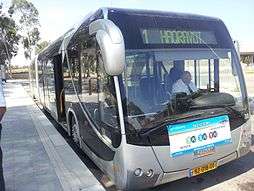Metronit
 | |
| Overview | |
|---|---|
| Native name | Hebrew: מטרונית |
| Locale | Haifa and the Krayot |
| Transit type | Bus rapid transit |
| Number of lines | 3 |
| Number of stations | 143 |
| Daily ridership | 92,000 (May 2015) |
| Annual ridership | 30 million (2014-2015 year) |
| Website | http://www.dannorth.co.il |
| Operation | |
| Began operation | August 2013 |
| Operator(s) | Dan Bus Company (Northern branch) |
| Number of vehicles | 90 |
| Technical | |
| System length | 60 km (37 mi) |
The Metronit (Hebrew: מטרונית), also spelled Matronit, is a bus rapid transit system in Haifa, Israel.
Overview
Name
The name, Metronit, was among some 500 suggestions submitted by the public in a prize-winning competition.[1] Metronit was chosen for several reasons. The name itself was deemed to be easily expressed, catchy and unique.[1] The Hebrew word, "Matronit" - meaning "respectable woman" or "lady" in Hebrew[2] - was felt to convey a feeling of elegance and respectability. The prefix "Metro-" implies an efficient metropolitan rapid transportation system; the trailing "-it" is in line with Haifa's existing Carmelit funicular subway and the Shkhunatit internal neighbourhood minibus system.[1]
Vehicles
The Metronit consists of 90 18.75-meter long high-capacity buses on three routes, with a capacity of 120-140 passengers per bus. Some of the buses operate with hybrid engines (six Phileas buses manufactured by APTS) and are currently being evaluated for more widespread use. The rest of the buses are conventional MAN Lion's City GL Diesel powered buses. The network is a total of 60 km (37 mi) in length - of which 40 km (25 mi) are dedicated roadways.[3]
The Metronit is unique in Israel in that it uses bi-articulated buses on specific routes. The choice of this mode of transport was due to the advantage of limited damage to the environment during construction, increased capacity on existing roads, and reduced operating costs compared to a standard bus or light rail line.
Construction
The Metronit project was developed by Yefe Nof, a company owned by the City of Haifa which is involved in planning public transportation, infrastructure, and other building projects in the Haifa metropolitan area. A tender for its operation was published in September 2009 with the original intention that the system be completed by Fall 2012. On August 4, 2010, it was announced that Dan won the tender to operate the system for 12 years. The cost of the system is estimated at 1.5 billion NIS (approximately $400 million US).[4]
Commencement of operations
The Metronit began testing on August 2, 2013, and passenger operations commenced on August 16, 2013.[5] As the first BRT system in Israel, there were initially many operational problems, caused mainly by a lack of priority at traffic lights, insufficient bus drivers and more passengers than anticipated. To promote the service, there was initially a period of free ridership[6] that ended on December 23, 2013.
In May 2015, the daily ridership on the Metronit was 92,000 - with a total of 30 million passengers using the system in the first year.[7]
Lines
There are currently three Metronit lines. The first operates from the Krayot Central Bus Station to Hof HaCarmel, the second from Kiryat Ata to Bat Galim Central, and the third from Kiryat Yam to Hadar HaCarmel.
| Line | Length | Towns served | Route description | Number of stations | Frequency | Approximate journey time (end to end) |
|---|---|---|---|---|---|---|
| Red Line (Line 1) | 25 km | Kiryat Motzkin, Haifa | From Krayot Central (in north Kiryat Motzkin), via Route 4, Histradrut Way, HaMifratz Central, and Downtown Haifa to Hof HaCarmel | 38 | Every 4–8 minutes during daytime hours (06:00-20:00), every 10–20 minutes at night (20:00-05:00). Operates 24/7 | 65 minutes |
| Blue Line (Line 2)) | 18 km | Kiryat Ata, Haifa | From Kiryat Ata to Bat Galim via Route 4, Histradrut Way, HaMifratz Central, and Downtown Haifa | 33 | Every 6–10 minutes during peak hours, every 12–30 minutes during off-peak (no night or Shabbat service) | 52 minutes |
| Green Line (Line 3) | 16 km | Kiryat Yam, Kiryat Haim, Kiryat Shmuel, Haifa | From Krayot Central, via Kiryat Yam, Kiryat Haim, Kiryat Shmuel, Histradrut Way, HaMifratz Central to HaNev'im Street in Hadar HaCarmel | 30 | Every 10 minutes during peak hours, every 12–60 minutes off-peak (no night or Shabbat service) | 50 minutes |
See also
References
- 1 2 3 "מי יודע מה זה 'מטרונית'? בחיפה יודעים" [Who knows what 'Metronit' is? Haifa knows]. ערוץ 7 (in Hebrew). 2006-09-05. Retrieved 2015-10-25.
- ↑ Eyadat, Fadi (2007-12-17). "בין אוטובוס לרכבת קלה התפשרו על "מטרונית"". הארץ (in Hebrew). Retrieved 2015-10-26.
- ↑ http://www.jpost.com/Israel/Haifa-to-get-new-Metronit-Bus-Rapid-Transit-system-by-2011
- ↑ "Dan Wins Tender for Operating the Haifa Metronit" (in Hebrew). Calcalist. August 4, 2010. Retrieved 2010-08-04.
- ↑ "Haifa Launches 'Metronit' System". Calcalist. August 16, 2013. Retrieved 2013-10-28.
- ↑ http://news.walla.co.il/?w=//2670525
- ↑ "Metronit Closes First Year: 30 Million Passengers". Ynet (in Hebrew). May 31, 2015. Retrieved June 13, 2015.
External links
- Metronit official website
- Yefeh Nof profile of the project (Hebrew)
- News report about choosing the name (Hebrew)